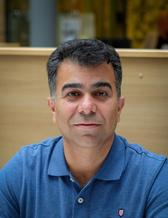Mustard gas harms the vision, skin and breathing. Three decades on, however, the predominant effect is mental ill-health. At a time when chemical warfare is a threat, researchers at the University of Gothenburg have now presented their study monitoring a group of victims of a historical gas attack.
With the war in Ukraine, threats to develop and use various weapons, including chemical warfare agents (CWAs), have been stepped up. Accordingly, Swedish defense authorities have raised the issue and emphasized the need to increase the nation's ability to withstand incidents involving chemical warfare.
Researchers at Sahlgrenska Academy, University of Gothenburg, have been studying a group of 18 Swedish residents who survived the severe gas attack of 1988 on Kurdish Halabja in northern Iraq. There, some 5,000 people were killed, and the number injured was even higher.
The purpose of the study was to investigate long-term impact on quality of life and the extent of depression among these survivors, 30 years after exposure to mustard gas, when they had reached a mean age of some 50 years. The study also included a nonexposed, gender- and age-matched control group of 30 Kurds living in Sweden.
Mental health worse than physical condition
The results, published in the scientific journal Health and Quality of Life Outcomes, show that the group exposed to mustard gas had a significantly lower quality of life than the control group.
The survivors of the Halabja gas attack also had more depressive symptoms, of greater severity, than the nonexposed controls. On average, when the survivors' mood was measured according to established methods and rating scales, members of the group were found to have what corresponded to moderate depression.

Overall, participants in the exposed group reported lower ratings in terms of psychological than physical well-being, despite their chronic lung complications. The group's results showed no gender-related differences in terms of either quality of life or degree of depression.
Early identification of mental ill-health
The study's first author, Faraidoun Moradi, is a doctoral student in occupational and environmental medicine at the University of Gothenburg's Sahlgrenska Academy, as well as licensed pharmacist and specialist in general medicine. In addition, he belongs to a center for disaster medicine, "Kunskapscentrum katastrofmedicin väst", based at the University of Gothenburg.
"The findings indicate that those exposed to mustard gas may need early identification of mental disorder and more support to promote their quality of life. It's important to obtain more clinical knowledge in the area, and to have guidelines and approaches to enable assessment and a proper response to the needs of exposed groups," Moradi says.






